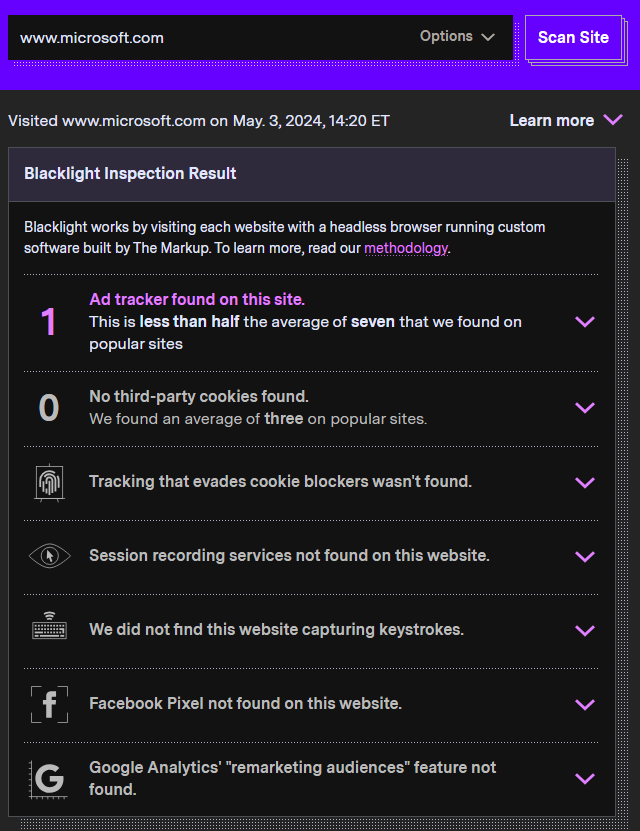Oh, that’s a relief. I thought the police would just buy the data from another company, that buys face data and runs recognition on it.
The base problem is the lack of an US privacy Policy, which don’t exist. In the EU an invasive surveilling like this is only possible after an court order on investigated persons because of an crime, or in case of certain events where there is a high risk of an attack, but this decision never depends on the police themselves.
The US protects source code under free speech. Meanwhile the EU is trying to ban encryption.
I wish we had some tech regulations but at least we can try to protect ourselves
Banning encryption was idea from the conservative and right wing parties, but no proceed. It’s not all perfect in the EU, but in these aspects light Years from the USA, which we also notice in the EU products of the big brother companies. f not, the fines are drastic.
eg Microsoft US vs Microsoft EU


that
buyssteals face data and runs recognition on it.
A new bullet point specifically prohibits using real-time face recognition technology on mobile cameras, such as dashcams and body cameras, to identify a person in uncontrolled, wild conditions.
Furthermore, it excludes facial recognition using stationary cameras in controlled settings, such as a back office.
Still problem with recorded video of mobile camera. How long until not „real-time“ anymore? 15 minute?
15 seconds at most
Until they force Microsoft to let them use it or they pay million
I’m pretty sure Microsoft can tell them to fuck off. Maybe they pay millions, but even then MS has to weigh the possibility of bad press and lawsuits against a relatively paltry sum. The larger problem will be if someone finds a workaround or simply ignores the terms of service, I think. This article talked about the “United States Police Department,” but there is no such department. Law enforcement in the US is highly fragmented across the federal, state, and local levels. Any of them could just decide to break the terms of service.
deleted by creator
They have write a formal cover letter… And enclose a check.
If regulations don’t get put in place fast enough, then the US is seriously going to be China 2.0.
It is kind of surprising to me that the US intelligence services are trying to be a better China
I’ve seen 3 different comments lately bitching some variation “if you don’t like America go deal with China’s social credit system!”
Ah yes a credit system meant to control behavior… Surely none of us have credit cards or losns because its the only way to do certain things like even finding a rental in some areas.
You can’t lose credit by calling Trump a cock gobbler. Credit control’s what you can afford/get based on debt history. Social credit controls every facet of your entire life based on how “good” a citizen you are. Imagine saying “Biden clearly has dementia” then not being able to get on the bus because you just got a -20 infraction for bad mouthing the holy Lord and now you’re completely barred from all public transport.
This is a very real scenario of China’s CCP controlled Social Credit System.
I’d like to avoid that for the US by blocking the technology from being used in this manner.
Also, I don’t have a credit card. (⌐■-■)Biden is passing a number of laws that do precisely those things, including making ANY criticism of Israel “antisemitic hate speech” and opening up fast passes to strip any org they don’t like of nonprofit status. Also, you can not have a credit card but that means there are certain things you aren’t allowed to access and certain areas you aren’t allowed to live. Saying “IDC” doesn’t mean you’re less restricted, just means you accept your restrictions.
Look, even if Biden wanted to, he can’t just waltz in and set up a full-blown social credit system like they have in China. The infrastructure and technology for that kind of comprehensive, government-controlled system just isn’t there (yet). If we can pass the right bills to block that kind of technology from being used for this purpose in the first place, then it really won’t matter what other laws he tries to push through.
And you know, even in places that seem to be “credit-only,” you can often still get by without a credit history, In many cases, you can actually talk the private owner or landlord into giving you access based on other factors, like your income, rental history, or whatever else they’re willing to consider. Sure, it might be a bit more of a hassle, and the landlord or business might give you a harder time. But the practical restrictions you face are nothing compared to what you’d see in an actual government-run social credit system. In those cases, you’d be completely shut out from entire aspects of life based on your social credit score - no wiggle room at all.
The credit card and private sector restrictions are honestly pretty minor compared to that level of government control. When it comes to renting, for example, if a landlord decides not to rent to you because you lack credit history, that’s really just their own personal decision as the property owner. The government isn’t mandating that. And the whole credit card system itself is run by private companies, not the government. These are financial tools that businesses have created, not some government scheme to monitor and restrict people’s lives.
The key distinction is that a true social credit system, like what they have in China, is directly controlled by the government. They’re the ones setting the baseline standards and dictating who can access certain things based on this overarching social credit score they’ve assigned to you. It’s not just about your personal finances or what private companies decide - the government is the one drawing those lines and controlling your access to basic services and opportunities.
In that kind of system, even if a landlord was willing to rent to you, they might not be able to because you don’t meet the government’s required social credit threshold for that particular region.
They’re essentially “redlining” people based on this government-run social credit system, in a way that goes far beyond anything we have with private credit cards and loans.
That level of comprehensive state control is a whole other beast compared to the more limited, private-sector driven credit systems we have.A major component that makes China’s entire social credit system work is they’re huge surveillance systems of high tech & low tech spy mechanisms like intrusive cameras, facial recognition software, automatic law enforcement systems, AI integration, web surveillance, “great firewall of China” and much more.
So while I agree Biden is pushing some concerning legislation on things like hate speech and nonprofits, that’s a separate issue from actually implementing a social credit system. Our focus should be on preventing that kind of technology and infrastructure from taking root in the first place. That’s where I think our efforts need to be directed.
Trusting MS to make quality products. Lmao
Not to trust, but at least some principles
Principles!? They have less of that than craftsmanship!






